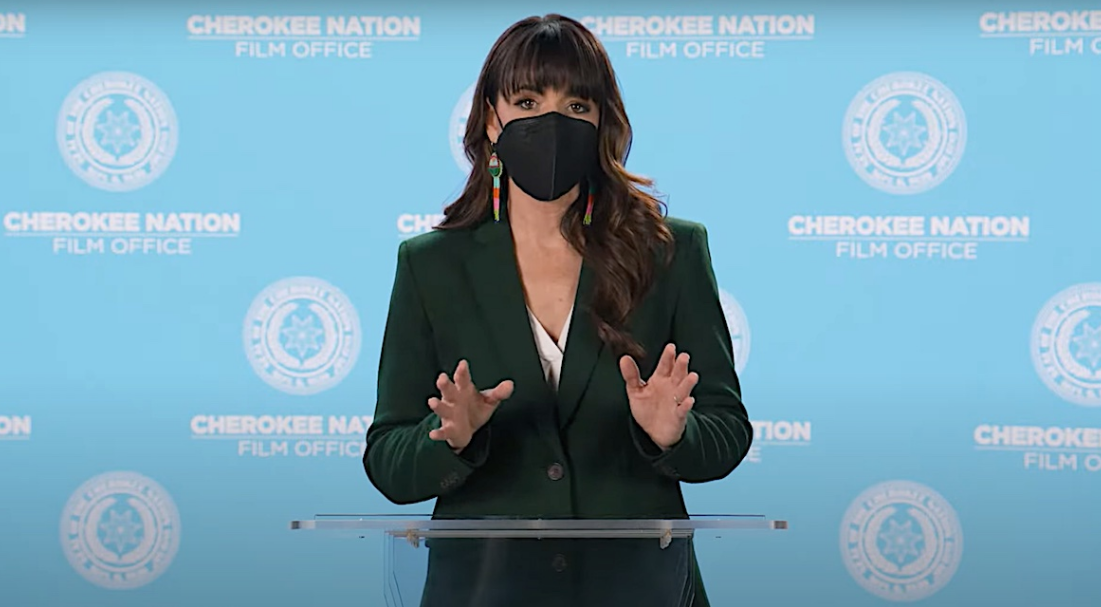
- Details
- By Chuck Hoskin Jr
Guest Opinion. From time immemorial, Cherokee people have shared stories to pass on our history and our values. The tools of storytelling have changed in the modern world, but the need to tell our stories is no less important. By growing the film and television industry within the Cherokee Nation Reservation, we can make sure our stories are seen and heard around the world. And we can be an important part of one of the most promising growth industries in Oklahoma.
In a historic investment, Cherokee Nation recently became the first tribal nation in the United States to provide a film incentive program. The Cherokee Nation Film Office will soon offer up to $1 million in annual cash rebates for qualifying productions filmed on our tribe’s 14-county reservation. Productions can earn a 20 percent cash rebate for qualified expenses, and productions that employ Native American citizens or use Native-owned businesses can boost their rebate to up to 25 percent.
Want more Native News? Get the free daily newsletter today.
Filmmakers can potentially combine the Cherokee Nation Film Incentive with the state of Oklahoma’s incentive, a $30 million annual rebate program signed into law last year.
Oklahoma is already emerging as one of the most desirable states for the film and television industry. This state has a wealth of cultural heritage, a talented workforce and diverse locations. This groundbreaking effort will enable us to take another step forward to making Cherokee Nation a national hub for filmmaking. We are adding the entertainment industry to our diverse mix of profitable businesses successfully operating in northeast Oklahoma, creating good jobs for our citizens and neighbors.
The Cherokee Nation incentive program was designed specifically to support tribal citizens, families and small businesses in local communities.
Many of the crucial positions that make this industry flourish are behind the scenes. That means opportunities for carpenters, electricians, caterers, drivers and other skilled staff. As the industry grows in Cherokee Nation, productions will need many more local staff working in technical and crew jobs. We have a skilled workforce in northeast Oklahoma and educational partners in higher education and Career Tech to grow it even more.

Since launching three years ago, our Cherokee Nation Film Office has made great progress in its mission to increase the presence of Native Americans in the film and television industries. Through scholarships; learning opportunities; a first-of-its-kind Native American talent and crew directory; and partnerships with state and local agencies, universities, nonprofits and other stakeholders, our film office is already making tremendous strides to open doors for Indigenous creatives.
Together, we are changing the narrative about Native peoples and culture. We are correcting many years of misrepresentation and harmful stereotypes. We are bringing diversity and accurate representations of Native identity to the film industry, and we are giving Native writers, directors, actors and other creative talent the chance to share our stories with the world.
The Cherokee Nation Film Incentive is our latest investment in helping prosperous industries flourish in Indian Country. It adds to the dynamic impact of Cherokee Nation’s people, businesses and government. I look forward to seeing good jobs, an economic boost, and new opportunities for our people to shine and thrive.
Chuck Hoskin, Jr. is the principal chief of the Cherokee Nation.
More Stories Like This
Defending UKB Sovereignty: Why Congress Must Reject CNO’s Power GrabOpposing the Transfer of Native Sacred Land Isn’t ‘Anti-American’
The Loss of Occupations and Identity in a Jobless World
Cherokee Nation Proves Summer EBT Works
The Overlooked Cost of VA Cuts: Native American Veterans Face Disproportionate Harm from Staffing Reductions
Help us tell the stories that could save Native languages and food traditions
At a critical moment for Indian Country, Native News Online is embarking on our most ambitious reporting project yet: "Cultivating Culture," a three-year investigation into two forces shaping Native community survival—food sovereignty and language revitalization.
The devastating impact of COVID-19 accelerated the loss of Native elders and with them, irreplaceable cultural knowledge. Yet across tribal communities, innovative leaders are fighting back, reclaiming traditional food systems and breathing new life into Native languages. These aren't just cultural preservation efforts—they're powerful pathways to community health, healing, and resilience.
Our dedicated reporting team will spend three years documenting these stories through on-the-ground reporting in 18 tribal communities, producing over 200 in-depth stories, 18 podcast episodes, and multimedia content that amplifies Indigenous voices. We'll show policymakers, funders, and allies how cultural restoration directly impacts physical and mental wellness while celebrating successful models of sovereignty and self-determination.
This isn't corporate media parachuting into Indian Country for a quick story. This is sustained, relationship-based journalism by Native reporters who understand these communities. It's "Warrior Journalism"—fearless reporting that serves the 5.5 million readers who depend on us for news that mainstream media often ignores.
We need your help right now. While we've secured partial funding, we're still $450,000 short of our three-year budget. Our immediate goal is $25,000 this month to keep this critical work moving forward—funding reporter salaries, travel to remote communities, photography, and the deep reporting these stories deserve.
Every dollar directly supports Indigenous journalists telling Indigenous stories. Whether it's $5 or $50, your contribution ensures these vital narratives of resilience, innovation, and hope don't disappear into silence.
 The stakes couldn't be higher. Native languages are being lost at an alarming rate. Food insecurity plagues many tribal communities. But solutions are emerging, and these stories need to be told.
The stakes couldn't be higher. Native languages are being lost at an alarming rate. Food insecurity plagues many tribal communities. But solutions are emerging, and these stories need to be told.
Support independent Native journalism. Fund the stories that matter.
Levi Rickert (Potawatomi), Editor & Publisher
